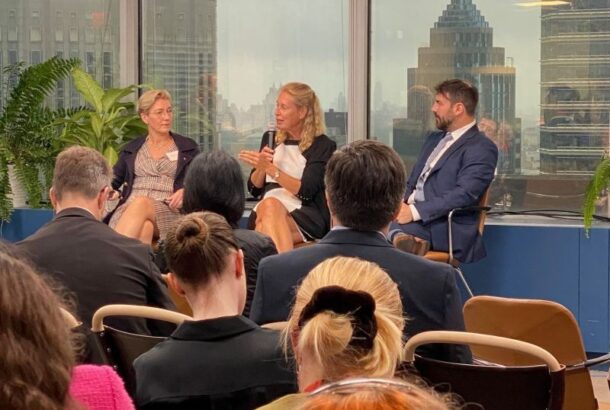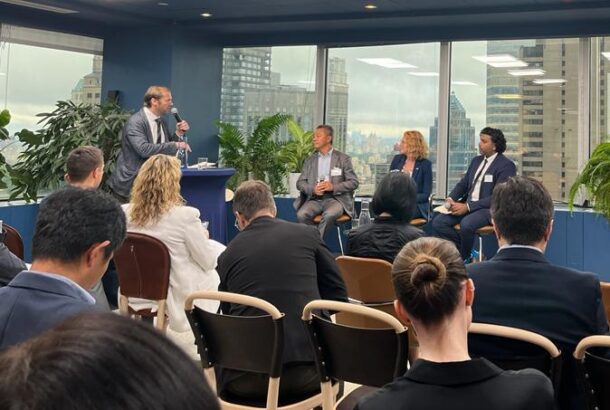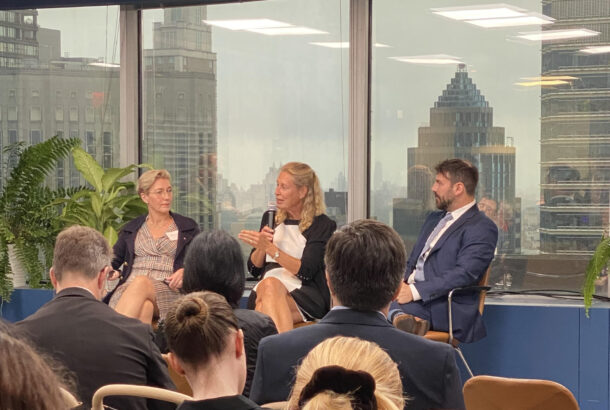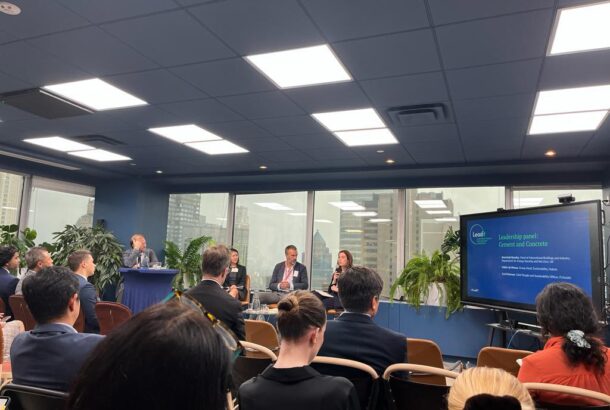Insights from LeadIT Climate Week NYC event.

Annika Ramsköld, CSO at Vattenfall; Jennie Cato, Global Director for Public Affairs & Partnerships, Scania; Tom Rollason, Private Sector Engagement Officer, Breakthrough Energy, Mission Innovation
At Climate Week NYC, LeadIT gathered experts, industry leaders, policymakers, key figures, and stakeholders to discuss the progress and challenges in industry transition.
The event began with a welcome from Sigrun Rawet, Deputy Director General of Sweden’s Ministry for Foreign Affairs. She highlighted the changing global dialogue and landscape since 2019 and emphasized the crucial role of government support in turning solutions into reality. She noted that the first fossil-free steel had already been produced but stressed the need for improved grid infrastructure, especially in the global South, to ensure equitable progress. Sigrun celebrated the Lead IT momentum, noting that membership had doubled and is supporting and contributing to various initiatives worldwide. She also highlighted the risks of an uneven playing field that could leave economies behind, emphasizing the urgency of a fast rollout of clean power and the need for spearheading commercial investments.
The second key-note speaker, Beniamin Strzelecki, Youth Advisor on Climate Change to the UN Secretary-General, emphasized the importance of engaging with youth, as they represent half of the world’s population. He encouraged companies to position themselves as net-zero entities to attract youth interest as employees, reminding the audience that, according to a survey by Student Energy, youth was sceptical of carbon capture projects.
Steel and Transport: Achieving Ambitious Goals

Robert Watt, moderator, LeadIT, Martin Pei, Executive Vice President and CTO, SSAB, Karin Svensson, Chief Sustainability Officer, Volvo Group, and Mahendra Shunmoogam, Director, International Trade Policy, Dept. of Trade and Industry, Government of the Republic of South Africa.
The first panel focused on the steel and transport sectors, discussing recent progress in low-carbon initiatives, mainly through off-take agreements. Adjusting national and global policy and regulatory frameworks, along with support for energy-intensive industries in emerging economies, is key to continuing decarbonization and creating sustainable global value chains.
Karin Svensson, Chief Sustainability Officer at Volvo Group, highlighted the importance of leadership and risk-taking in setting targets throughout the value chain for a 2040 net-zero goal. When asked about SSAB’s recalibration of ambition over the last 4 years, Martin Pei, Executive Vice President and CTO explained how the company set an ambitious goal of achieving fossil-free steel by 2030 after initial success in 2021. This represented an acceleration of about 15 years from the goal announced in 2019.
Mahendra Shunmoogam, Director of International Trade Policy for South Africa reminded the audience of the uneven starting position that young democracies, and the historical injustice and patterns developing countries faced on their path towards decarbonisation. He stated that considering that the South had not caused climate change – a fair transition could not be achieved without the delivery of international partnerships as promised. He also emphasized that a global level playing field and a just transition requires consideration by the global North for the negative impacts of their decarbonisation policies on developing countries, the forthcoming EU CBAM being one example of this.
Fossil-Free Energy: Credibility and Scaling Up Projects

Annika Ramsköld, CSO at Vattenfall speaks at the Lead IT event during Climate Week NYC alongside Jennie Cato, Global Director for Public Affairs & Partnerships, Scania and Tom Rollason, Private Sector Engagement Officer, Breakthrough Energy, Mission Innovation.
In the second panel, leading companies demonstrated the feasibility of decarbonizing industries such as steel, cement, and heavy transport. The emphasis now is on scaling these projects commercially, which involves intensified efforts to decarbonize energy, grids, and infrastructure.
When asked about factors that have led to success and ways to show credibility, Jennie Cato, Global Director for Public Affairs & Partnerships at Scania, discussed the company’s commitment to cut scope 1, 2, and 3 emissions and its strategy in hotspots like battery production and steel. She added that politicians need to be on board for the long term.
Annika Ramsköld, CSO at Vattenfall, spoke about setting ambitious targets and the importance of collaboration when working together between industry and government, providing the permitting process for green hydrogen as an example. She talked about the need to get fossil-free energy in place to enable the transition of heavy industries like steel, cement, and transport away from fossil fuels. Some of the remaining challenges included; permitting processes having a more systemic perspective, access to talents, and acceptance that the transition will not go unnoticed but that we have an obligation to listen and take dialogues with all impacted to find the best solutions, to ensure a just transition.
Tom Rollason, Private Sector Engagement Officer, Breakthrough Energy and Mission Innovation emphasised that no industry will reach their targets without access to fossil-free energy and that investments in clean energy needs to include both energy efficiency, scaling up renewable energy and potentially also consider nuclear energy if this is an alternative that can compete on land use and price.
Cement and Concrete: Building Partnerships to Address Future Challenges

Cori Petersen, CSO, FLSmidth; Cédric de Meeus, Group Head, Sustainability, Holcim; Amarinda Bazeley, Head of International Buildings and Industry, Department for Energy Security and Net Zero, UK
While a growing number of carbon capture demonstration projects are being launched, continued attention is needed on the immediate potential of material efficiency in driving decarbonization. Both public and private actors can also play an incentivizing role in reducing the green premium of low-carbon cement.
In the third panel, Cédric de Meeus, Group Head of Sustainability at Holcim discussed the importance of youth pressure and investor inquiries in driving decarbonization efforts in the cement industry. He also, when prompted, said the next five years were showtime to deliver CCUS projects; the plans are there but need to become operational.
Cori Petersen, Chief People and Sustainability Officer stressed the importance in the coming years of alignment between policy, suppliers, and companies to make change, as well as the need to innovate and work with other partners.
Amarinda Bazeley, Head of International Buildings and Industry at the UK Department for Energy Security and Net Zero, shared news from the Breakthrough Agenda, announcing that a new breakthrough was coming, with France and Morocco leading on buildings and Canada leading on cement to create the enabling conditions to deliver by 2030. She reminded the audience about the Breakthrough recommendation on buildings, and that the Building Breakthrough looks forward to seeing how governments can come together to move this forward. “Most unbuilt buildings will be in Africa so need to ensure that global South is brought along” she reminded those in attendance.
Key Takeaways
Per Andersson, Head of LeadIT Secretariat summarised the debate and acknowledged the five central themes of discussions;
1) Leadership. Leaders need to dare to be first, to take risks, to innovate and co-develop. Private sector clearly daring Governments to stay the course on vision. Dare to have ambition.
2) Ambition. Do have the ambition to scale, speed-up and be credible, incl. science-based target. But important to recognise that ambition in one region may have unjust effects for others.
3) A Just and Equitable Transition. It is crucial to have a just transition locally, nationally, regionally and globally – to ensure a level playing field and inclusion. The need to bridge the divide and recognise historical unfairness and to be a genuine partner.
4) The value of Partnerships. Between North-South, between Governments and with private sector and civil society. To craft and agree on a common path.
5) The importance of the value chain. Without change in the entire value change and all suppliers (up- and down streams) the transition will never be complete.
Lastly, the future belongs to our youth and agents of change. They will give us skills, opportunity and hope. Listen to them.
